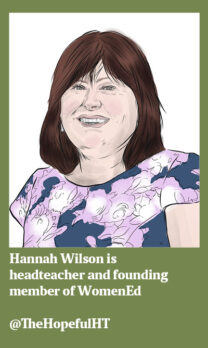Fake it till you make it they say . . . But what if you don’t? (make it, that is!)
@LyndsayBawden
Writing on the #WomenEd blog, Lyndsay Bawden shares the journey of her return to work after maternity leave, through navigating the seas of anti-depressants to applying for a promotion – despite her feelings of inadequacy.
She ended up “stagnating, not taking opportunities when they called, and generally feeling that I wasn’t good enough to be a leader, constantly comparing myself to others around me.”
After seeing “one of my talented and hard-working, but less experienced, colleagues get promoted to a job I hadn’t even considered applying for”, Bawden decided to take action.
After getting the job, she was haunted by the sense that she wasn’t good enough. “I had duped and deceived them at interview, they thought they were getting someone good, someone who KNEW things, someone who could DO stuff, but instead they got me!”
Her raw honesty will echo the inner critics that torment many of us and will give us that little bit of hope to keep us going.
Be Yourself
@BaldHeadteacher
Bald Headteacher muses on his colleagues being their authentic selves at school. His argument is simple: he advocates for his teachers having hobbies and interests outside of school.
“Teachers have always been most effective when they are allowed to be themselves. Confident schools allow them to stamp their personality on their classes, do things their way.”
Much like the character education focus for our children in our schools, he states the obvious: teachers with hobbies and interests add value to our schools as they bring a balanced perspective to the team.
“Children are fascinated and inspired by the fact that you sing in a choir, or play sport at the weekend, or are an amazing cook, or went to a particular gig on Saturday night. I think bold and confident schools encourage this, even if it can challenge policy and protocol on occasion.”
From Little Acorns Grow
@cerasmusteach
“One of my mother’s favourite proverbs is ‘From Little Acorns Do Mighty Oaks Grow.’ It reminds us that great things may come from small beginnings, to be patient and persist.”
Clare Erasmus uses this proverb to narrate her journey into the world of edtech solutions to problems we are facing in schools. As wellbeing lead she has co-designed an app call Teen Mind, which recently won the Impact Award at BETT. She has engaged a team of student wellbeing ambassadors and over 500 students in creating and inputting content to the app.
She says winning the award was “a wonderful endorsement that building a culture that emphasises the importance of mental health and wellbeing is not separate to teaching and learning, but is at the heart of creating positive and effective learning environments.”
Even more exciting, the blog reveals her book about leading mental health and wellbeing on a budget will be out soon!
Dialogues
@_bigeducation
This blog captures a profound and thought-provoking event run by the Big Education Academy Trust, where educators committed to change cite examples of significant cross-community cultural changes.
Russell Hobby, the chief executive of Teach First, presented at the event, which explored the theme of innovation in education, asking, “What does it take from us as leaders to build these creative capabilities that will change the sector?” The blog summarises Hobby’s five barriers to innovation and his five positive challenges for action.
Early Career Framework, Recruitment And Retention
@TeacherDevTrust
David Weston, the chief executive of the Teacher Development Trust, reflects on the Department for Education’s new publication on teacher recruitment and retention and the Early Career Framework. Under the headings Culture, Early Career Support, Retention and Careers and Recruitment, he provides a succinct summary of what has been published and what is yet to come, plus links to the relevant documents all schools need to review and act on.
Weston is also chair of the CPD Expert Group, which, he reveals, has been charged by the DfE to explore how to help all schools improve the provision of professional development to all staff (not just new teachers).













Your thoughts